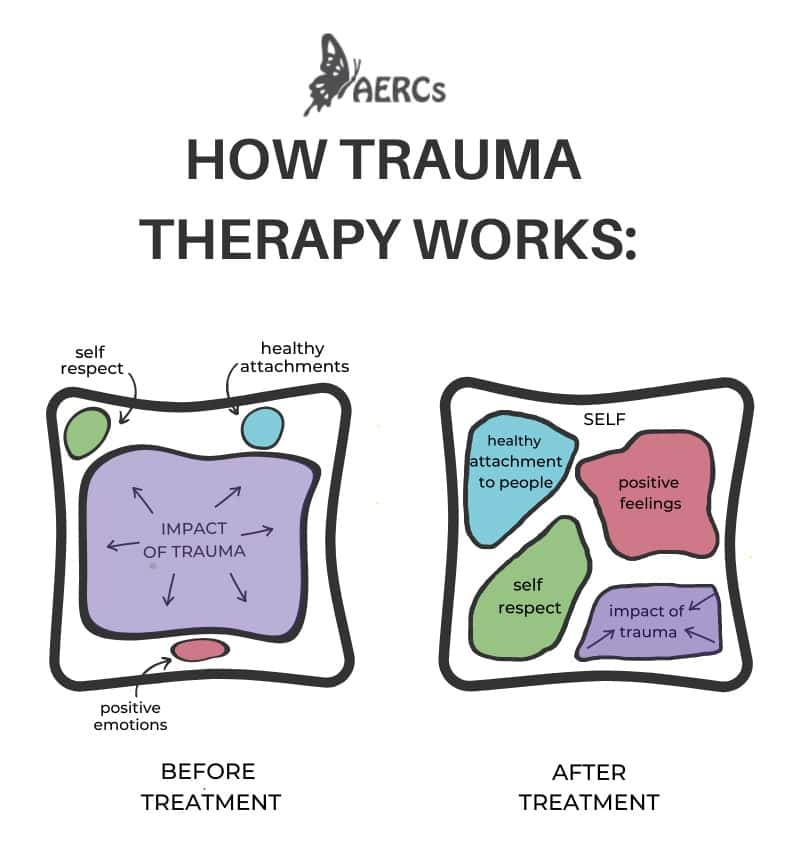Hello, Veterans in Toronto, Mississauga, and Orangeville!

I’m Gloria Segovia, the founder of AERCS, and it’s with a deep sense of commitment that I speak to you today about an issue very close to my heart ? trauma therapy and PTSD support, especially for our veterans. You might be seeking understanding and healing after your service, and I want you to know: you’re not alone. You’ve found a place of understanding and support.
TL;DR Key Takeaways.
- Canadian veterans face significant trauma and PTSD challenges.
- Recognizing symptoms of trauma and PTSD is crucial for effective treatment.
- Trauma-informed care offers specialized support, emphasizing empathy and understanding.
- AERCS provides tailored trauma therapy services for Canadian veterans.
- The journey to recovery involves choosing the right therapist and personalized treatment plans.
- There’s a focus on empowering veterans through their healing process.
For more detailed information, please visit the AERCS Trauma Therapy Ontario page.
In the heart of Canada’s valiant community, many veterans carry unseen scars, trauma and PTSD, remnants of their service.
Acknowledging these wounds marks a critical step towards healing. Trauma Therapy for Canadian Veterans, opens the door to understanding and addressing these challenges.
With growing awareness, underscores the significance of reaching out for support, aiming to guide heroes on a journey of recovery.
Through empathy and engagement, let’s explore how trauma therapy offers a beacon of hope to those who’ve served, lighting the path to reclaiming peace and resilience.
Exploring the landscape of trauma and PTSD among Canadian veterans unfolds a narrative grounded in stark realities.
A significant survey reveals that 13% of Canada’s regular force veterans grapple with PTSD, a testament to the challenges faced post-service.
Furthermore, a 2018 study sheds light on anxiety disorders, with 48% of female veterans and 38% of male veterans reporting symptoms, underscoring a heightened vulnerability compared to active military personnel.
Deployment-related trauma further paints a grim picture, with an estimated prevalence rate of PTSD at 2.33 in military personnel aged 18 and older, spotlighting the profound impact of service on mental health
Additionally, national statistics indicate that about 10% of Canadian women are likely to meet the criteria for probable PTSD, hinting at a broader societal issue.
These facts underscore the critical need for accessible and effective trauma therapy, advocating for a path towards healing and resilience for our veterans.
Understanding Trauma and PTSD.
Trauma and PTSD encompass experiences where individuals face overwhelming stress that exceeds their ability to cope, often leaving deep psychological scars.
These conditions stem from varied events, combat, accidents, or personal violence, each leaving its unique imprint. Trauma therapy becomes essential as it addresses these wounds, facilitating a journey towards healing.
The ripple effects of trauma and PTSD extend far into daily life, influencing emotional stability, relationships, and overall well-being.
Through trauma therapy, individuals learn to navigate these challenges, aiming for a state of recovery that restores balance and peace in their lives.
Why is Trauma Therapy essential?
Trauma therapy is crucial as it offers specialized approaches tailored to the unique experiences and needs of those dealing with trauma, enabling effective healing processes.
Reaching out to AERCS for trauma therapy is advisable because their services are specifically designed to support individuals, including Canadian veterans, through trauma-informed care.
This care recognizes the complex impacts of trauma on an individual’s life and offers a pathway towards recovery, emphasizing empathy, understanding, and professional support to navigate the healing journey.
The Journey to Recovery.
Acknowledging the need for help marks a significant step on the journey to recovery for those grappling with trauma.
This realization, coupled with the courage to seek support, is foundational. Trauma therapy plays a vital role in this journey, offering a safe space to process traumatic experiences, learn coping strategies, and work towards healing.
Its importance cannot be overstated, as it provides a structured approach to address the complexities of trauma, facilitating a path towards emotional and psychological well-being.

Why Trauma-Informed Therapy?
Trauma-informed therapy prioritizes understanding the wide-reaching effects of trauma to offer more effective support.
Unlike traditional therapy, it integrates an awareness of trauma’s impact on both mental and physical health, shaping the therapeutic approach with empathy and sensitivity.
For veterans, this method proves particularly beneficial, addressing their unique experiences with empathy, understanding, and care.
It involves specialized strategies designed to acknowledge and heal trauma, providing a compassionate framework that recognizes the significance of past experiences in the healing journey.
Trauma-informed therapy involves understanding and acknowledging your trauma as a significant part of your past that affects your present. It’s a step-by-step process where:
- You’re provided a safe space to share your experiences without judgment.
- The therapy recognizes the impact of trauma on your life, validating your feelings and reactions.
- Together, you and your therapist explore coping strategies tailored to your specific needs, fostering resilience.
- You’re empowered to reclaim control over your life, with the support to navigate healing at your own pace.

The Story of “Joe”.
To preserve privacy and confidentiality, we’ll call him “Joe”.
Joe, a Canadian veteran, endured a harrowing experience overseas that left him with deep psychological scars.
This trauma manifested in his daily life through nightmares, isolation, and a lingering sense of danger, eroding his relationships and quality of life.
At his lowest, feeling disconnected and lost, Joe reached out to AERCS for help. Through trauma therapy, he embarked on a path of healing, learning to process his experiences and regain a sense of control.
His therapy focused on building resilience, understanding triggers, and fostering connections with others.
Joe’s story transformed from one of survival in the shadows of his trauma to living a life illuminated by hope and understanding.
His journey illustrates the profound impact of specialized support and the potential for renewal that trauma therapy offers, especially to veterans facing similar battles.
Remember, reaching out for help is a sign of strength, not weakness. If you’re trauma therapy in Toronto, the GTA, or nearby areas, know that it’s a step towards a healthier, happier journey.
Choosing the Right Therapist.
Finding the right therapist is crucial because therapy is a highly personal process.
Therapists differ in their specializations, approaches, and personalities. A good fit can significantly enhance comfort, trust, and effectiveness of therapy, especially for trauma where understanding and relatability are key.
The right therapist can adapt techniques to suit an individual’s specific needs, ensuring a more successful healing journey.
Choosing the right therapist for trauma therapy involves several key steps:
- Look for Specialization: Ensure the therapist has experience and training in Trauma Therapy and PTSD.
- Verify Credentials: Check their licensing and professional background in mental health care.
- Consider Therapeutic Approach: Different therapists use various methods. Find one that aligns with your comfort and needs.
- Assess Compatibility: It’s important that you feel comfortable and understood by your therapist.
- Inquire About Their Experience with Veterans: If you’re a veteran, a therapist familiar with military culture and veteran issues can be beneficial.
- Evaluate Accessibility: Consider location, appointment availability, and whether they offer remote sessions.
- Ask About Their Approach to Trauma Therapy: Understanding their methodology can help you gauge if it suits your healing process.
Feel free to reach out if you have any questions.
At AERCS, we’re more than happy to guide you through the process, answer any concerns, and ensure you feel supported in finding trauma therapy that meet your needs.
Reach Out to AERCS.
Embark on your healing journey by connecting with AERCS for trauma therapy services.
Our team is ready to support you with specialized care.
Scheduling a consultation is straightforward, offering you the first step towards recovery.
Learn more and reach out on our Trauma Therapy page: AERCS Trauma-Informed Therapy.
In Closing….
Understanding the gravity of trauma and PTSD among veterans is paramount. It’s more than just a call for awareness, it’s an invitation to action.
Trauma therapy stands as a cornerstone in this journey, offering more than just treatment; it promises hope, healing, and a chance at a renewed life.
Remember that the path to recovery, while challenging, is paved with support, expertise, and empathy. Your journey is important, and reaching out for help is a brave first step towards a brighter future.
Is Trauma Therapy Right for You?
Discover how AERCS can assist in just 5 minutes!
Steps to Begin Your Trauma Therapy Journey with AERCS
Easy Guidance: How to Get Started
Beginning your journey with AERCS for Trauma Therapy is straightforward. Here are the simple steps to get you on a positive path :
- Phone AERCS: Call us at 1-800-679-5536 to speak directly with our team.
- Online Contact Form: Fill out our contact form at AERCS Contact for a quick response.
- Book Using Jane App: Conveniently schedule an appointment at AERCS Jane App.
- Complimentary 20 Minute Consultation: Request a complimentary call to understand your needs and match you with the right therapist.
Taking the First Step
Taking the first step might feel daunting, but it’s a powerful move towards helping enriching your life.
Every journey starts with a single step. By choosing to explore trauma therapy in the Toronto, Mississauga, or Orangeville areas, with AERCS, you’re making a positive commitment to your own journey. We’re here to guide and support you every step of the way.











